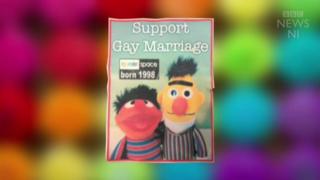
A Northern Ireland bakery found to have discriminated for refusing to make a "gay cake" will have its appeal heard by the Supreme Court later on Tuesday.
Ashers Bakery is challenging the ruling over their decision - in 2014 - not to make a cake iced with the slogan "Support Gay Marriage".
The Supreme Court will hear the case on Tuesday and Wednesday during its first hearings in Northern Ireland.
The case has so far cost the Equality Commission of Northern Ireland £150,000.
It is only the second time the Supreme Court, established in 2009, has sat away from its permanent home in London. Last June the court held four days of hearings in Edinburgh.
The court's judgement on whether the owners of Ashers Bakery were guilty of unlawful discrimination is expected to be handed down later in the year, or possibly in early 2019.
'Gay cake' back in court
by Chris Page, Ireland correspondent
This court case is a clash over rights, freedom and faith - and it's focused on a cake.
In 2014, a gay rights activist, Gareth Lee, made an order in Ashers Bakery in Belfast city centre.
He wanted a cake with a slogan in support of the campaign to legalise same-sex marriage in Northern Ireland. But the owners of Ashers said that was at odds with their Christian beliefs.
A judge ruled the bakery discriminated against Mr Lee on the grounds of his sexuality. Ashers lost an appeal against that judgement.
Now they're taking the case to the highest court in the UK.
Tuesday marks the latest legal chapter in the long-running case that began in May 2014 when the order was placed at an Ashers shop in Belfast by gay rights activist Gareth Lee.
Ashers refused to bake the cake but was later found to have discriminated against Mr Lee.
The Christian owners of the bakery have repeatedly challenged the ruling.
The firm argued that the cake's message was against the bakers' religious views.
Arriving outside the court on Tuesday, accompanied by his wife Amy, Ashers general manager Daniel McArthur said the case had "always been about the message".
"We didn't say no because of the customer; we'd served him before, we'd serve him again. It was because of the message.
"But some people want the law to make us support something with which we disagree."
The move to take the case to the Supreme Court came after Appeal court judges said that, under law, the bakers were not allowed to provide a service only to people who agreed with their religious beliefs.